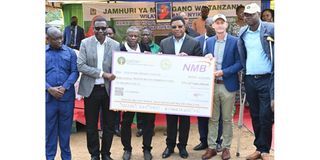Prime
Eight Katavi villages earn Sh4.2billion in carbon credits

What you need to know:
- The eight communities yesterday received Sh4.2 billion in carbon sales, thanks to their efficient and effective implementation of conservation projects
Katavi. Tanzanians are increasingly reaping billions of shillings through carbon credits, with the latest beneficiaries being eight village communities in Katavi Region.
The eight communities yesterday received Sh4.2 billion in carbon sales, thanks to their efficient and effective implementation of conservation projects.
This demonstrates that the effective implementation of conservation projects is not only good for the environment, but also a money-spinner for conservationists.
This time around, the beneficiaries are eight villages in Tanganyika District, Katavi Region, namely Lugonesi, Mwese, Lwega, Bujombe, Kapanga, Katuma, Mpembe and Kagunga.
The payment took to Sh6.5 billion in carbon credits the eight village communities have earned this year after they were paid Sh2.3 billion in the last eight months.
The payment is effected after carbon credits accumulated from the forestry protection have been sold to the voluntary carbon market.
High-quality certified carbon credits are generated by protecting the Village Land Forest Reserves (VLFRs) under the expertise and support of an investor, Carbon-Tanzania that entered into a contract with village governments in 2017.
The contracts require the eight village communities to engage with Carbon-Tanzania in protecting their forests using the Reduce Emissions from Deforestation and Forest Degradation in Developing Countries (REDD) under Ntakata Mountain Project.
By stopping deforestation, the communities are contributing to the global fight against climate change.
When forests are cut down carbon dioxide is released into the atmosphere, but on the contrary, prevention measures result in emission reduction measured as carbon credits.
Carbon-Tanzania then sells the credits on the voluntary carbon market, therefore providing communities with access to the global financial system.
Last year, the communities earned over $1.5 million in carbon credit revenues which is equivalent to over Sh3.4 billion.
Speaking after handing over the dummy cheque to beneficiary villages yesterday, Prime Minister Kassim Majaliwa commended citizens from the villages for efficient supervision of the projects.
However, the Premier, who is also the Ruangwa MP, challenged the villages to make better use of the funds by investing in development projects that will benefit the community.
“That’s why I commend the construction of the Sh180 million Kagunga Dispensary from carbon credit revenues,” he said.
Speaking during the event, Tanganyika District Executive Director Shaban Juma said Sh1.852 billion revenue, earlier received have been utilized for implementing projects in the areas of education, health, market and local government.
He said while Sh873.24 million have been used in the area of education, Sh844.32 million for health projects, Sh50.83 million and Sh63.44 million for construction of a market and a local government office respectively.
“Low understanding among citizens is a major challenge facing the project, something that contributes to persistent incidents of environmental degradation. The incidents include bush fire, deforestation, livestock grazing and crop farming in forestry reserves,” he said.
“The district council is continuing educating citizens and community leaders to increase their awareness about environmental conservation. We are also implementing projects that will directly benefit citizens including provision of health insurance, construction of dispensaries and healthcare centres,” he added.
Earlier, Carbon-Tanzania chief executive officer Marc Baker said the Ntakata Mountains Project covers 216,994 hectares of Miombo woodland in the Greater Mahale Ecosystem in western Tanzania, engaging over 38,000 people from eight villages.
He said by developing the VFRs, the communities are able to protect important habitat for endangered eastern chimpanzees and create a link between the Greater Mahale ecosystem and elephants in Katavi National Park.
“The farming communities: the Bende and Tongwe also protect their forests storing its valuable carbon to income generation through REDD,” he said.
Furthermore, he said over 64 people have been directly employed in forest conservation activities, including scouts who have been trained in wildlife monitoring.
“Deforestation has drastically declined from 3.5 percent recorded prior to project commencement which is above the accepted national average. It prevents the felling of 1.5 million trees and 550,000 carbon dioxide emissions annually,” he said.
Mr Baker said the project protects endangered eastern chimpanzees, wild dogs, Egyptian and lappet-faced vultures as well as vulnerable species such as elephants, ground hornbills, martial eagles, giraffes, pangolins, leopards and lions.




